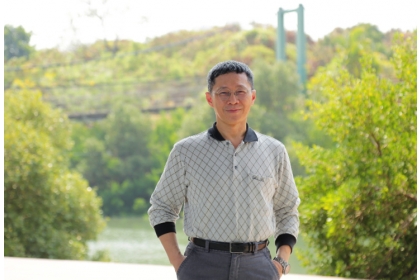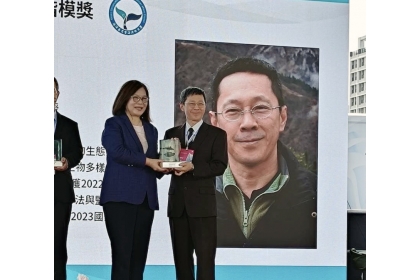Research on marine ecosystems and blue carbon received recognition. Professor Hsing-Juh Lin of NCHU received the Marine Conservation Contribution Model Award from the Ocean Affairs Council.
2024-06-24
興新聞張貼者
Unit秘書室
1,377
On June 15, the Ocean Affairs Council awarded Professor Hsing-Juh Lin, a Lifetime Distinguished Professor in the Department of Life Sciences at National Chung Hsing University, the Marine Conservation Contribution Model. Professor Lin is one of Taiwan's few researchers who have conducted studies on integrated ecosystems. His whole ecosystems research focuses on current ecological research, addressing climate change and biodiversity loss.
Professor Lin's significant contributions to marine conservation include transforming the ecological studies of Taiwan's important marine coastal ecosystems—such as lagoons, estuaries, mangroves, salt marshes, seagrass beds, and coral reefs—from the conventional study of communities and populations to a cross-disciplinary systematic ecological study, utilizing model integration and systematic analysis. Using scientific data, he investigates ecological and biodiversity conservation techniques at the macroscopic ecosystem scale, gaining a comprehensive understanding of the structure and function of tropical and subtropical marine ecosystems while addressing research gaps left by European and American experts. He created ecological food web models for Dapeng Bay, Qigu Lagoon, Guoseng Bay, Tamsui River Estuary, Kenting Coral Reefs, Miaoli Coast, Dongsha Seagrass Beds and the East China Sea.
Furthermore, Professor Lin started researching “blue carbon” (seagrass beds, mangroves, and salt marshes) fifteen years ago. By developing a carbon balance model and evaluating carbon sequestration capacity, he quantified the value of various ecosystem services, investigating trade-offs and the optimal modes for management. He is committed to integrating economic and legal issues to create nature-based voluntary carbon offset mechanisms and legal frameworks for biodiversity conservation, aiming to achieve multiple objectives. He has finished publishing “Afforestation of Mangrove Habitats in Taiwan” and “Methodology for Seagrass Bed Restoration in Taiwan,” which will serve as the foundation for a voluntary reduction in marine blue carbon. He also proposed the “Taiwan Mangrove Carbon Sink Measurement Standard Operating Procedures” and the “Taiwan Seagrass Bed Carbon Sink Measurement Standard Operating
Procedures,” which will serve as the foundation for incorporating marine blue carbon into the national greenhouse gas emissions inventory.
Professor Lin's exceptional contributions to marine blue carbon research have earned him the 2022 Global Sustainable Carbon Neutrality Research Award. He established the natural carbon sink measurement methodologies and monitoring methodology, which are now widely used in 18 venues in the public sector and 15 government institutions. Professor Lin earned the National Agricultural Science Award in 2023 and the National Science Council's Outstanding Research Award in 2024.
Professor Lin's significant contributions to marine conservation include transforming the ecological studies of Taiwan's important marine coastal ecosystems—such as lagoons, estuaries, mangroves, salt marshes, seagrass beds, and coral reefs—from the conventional study of communities and populations to a cross-disciplinary systematic ecological study, utilizing model integration and systematic analysis. Using scientific data, he investigates ecological and biodiversity conservation techniques at the macroscopic ecosystem scale, gaining a comprehensive understanding of the structure and function of tropical and subtropical marine ecosystems while addressing research gaps left by European and American experts. He created ecological food web models for Dapeng Bay, Qigu Lagoon, Guoseng Bay, Tamsui River Estuary, Kenting Coral Reefs, Miaoli Coast, Dongsha Seagrass Beds and the East China Sea.
Furthermore, Professor Lin started researching “blue carbon” (seagrass beds, mangroves, and salt marshes) fifteen years ago. By developing a carbon balance model and evaluating carbon sequestration capacity, he quantified the value of various ecosystem services, investigating trade-offs and the optimal modes for management. He is committed to integrating economic and legal issues to create nature-based voluntary carbon offset mechanisms and legal frameworks for biodiversity conservation, aiming to achieve multiple objectives. He has finished publishing “Afforestation of Mangrove Habitats in Taiwan” and “Methodology for Seagrass Bed Restoration in Taiwan,” which will serve as the foundation for a voluntary reduction in marine blue carbon. He also proposed the “Taiwan Mangrove Carbon Sink Measurement Standard Operating Procedures” and the “Taiwan Seagrass Bed Carbon Sink Measurement Standard Operating
Procedures,” which will serve as the foundation for incorporating marine blue carbon into the national greenhouse gas emissions inventory.
Professor Lin's exceptional contributions to marine blue carbon research have earned him the 2022 Global Sustainable Carbon Neutrality Research Award. He established the natural carbon sink measurement methodologies and monitoring methodology, which are now widely used in 18 venues in the public sector and 15 government institutions. Professor Lin earned the National Agricultural Science Award in 2023 and the National Science Council's Outstanding Research Award in 2024.



